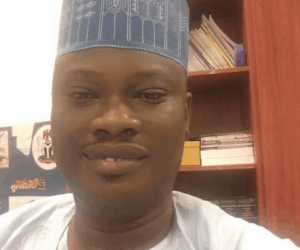Penultimate Thursday, the religious space in Niger state was jolted by the order that all preachers must obtain licences before they can propagate their messages. For now, all forms of religious preaching have been banned. The pronouncement could stir the hornet’s nest even beyond the state. This should be expected in a religion-crazy country where there are more worship centres than industries and beer halls put together.
Nigerians are so rabidly committed to their religions to the extent that they can kill or be killed over religious differences. They are also famous for devoting quality and productive moments to praying, in the belief that the Almighty God has the listening ears for billions of throats that roar in supplications every second while He sits comfortably on His Throne some billions of kilometres away! And so, any attempts to abridge the process of communing or fellowshipping with Him are expected to be met with holy anger.
According to the Director General of the Niger State Religious Affairs, Umar Farooq, preachers have two months from last week to obtain the licences or preach no more. He explained that all the preachers needed to do was to obtain forms and fill them, after which they would face a panel for screening. Eligible ones would then be licensed to preach without any let or hindrance but within the ambit of the new order.
The decision has drawn fireworks from some quarters. An early attacker is the Chief Imam of the Federal University of Technology, Minna, Bashir Yankuzo. He said the government cannot stop preaching, arguing that preaching is a command (from above) and that the government is not paying anyone for doing the job. And that people are preaching in order to “earn the pleasure of God. So, the government cannot dictate who to preach to and not who not to preach to.”
In other words, since the government does not pay the preachers, it cannot dictate the tune! Imam Bashir, however, clarified that if there “are people who are going out of their way to cause security threats, using abusive words and so on, the government can have control over that in order to maintain peace and security.”
Another Islamic scholar, Ustaz Hassan, in his reaction, said the order “needs to go to the State Assembly for proper legislative action.”
A Minna-based journalist and Islamic scholar, Uthman Siraja, also condemned the order, saying “it is an infringement on religious rights. He argued that the best thing the government could do is to penalise any preacher who incites the public in the cause preaching.”
The Secretary of the Niger State Chapter of the Christian Association of Nigeria (CAN) in his reaction said the Christian body is not aware of the new policy or order, promising to come up with a statement when it is officially informed.
On the continent, Rwanda stands out as a country with a statute in place to regulate not only preaching but who should also qualify as a preacher. In 2018, the nation’s parliament passed a law on preaching by all Faith-based Organisations (FBOs) in that one-time war ravaged country. Under the law, all religious leaders must undergo training and adhere to codes of conduct, requiring compliance with what it called the “Rwandan values”.
Preachers must complete a minimum number of training hours on Rwandan history, including the history of the genocide against the Tutsi. Religious institutions must adopt codes of conduct that specifically prohibit hate speech, discriminatory practices, and teachings that undermine national unity. Preaching is also regulated to prohibit teachings and practices that promote divisionism, genocide ideology, discrimination, or incite violence. The 2018 law requires pastors to have a theology degree before they can start their own churches. It also requires the FBOs to declare grants to the Rwanda Governance Board.
Under that law, any financial support to an FBO must be channeled through the organisation’s account in a bank or a financial institution in Rwanda and not a private account as commonly practised in Nigeria. The law gave a period of five years for those already in service to acquire qualifications or be booted out of the ministry.
The FBOs must be registered with the Rwanda Governance Board (RGB) and comply with various regulations, including building codes, sanitation, and financial disclosure requirements. The RGB is responsible for registering, monitoring, and revoking the legal status of FBOs that do not comply with the law.
The law is intended to protect citizens from exploitation by “conmen” and to ensure safety in prayer houses as well as curb the spread of misleading teachings, false prophecies, and conspiracy theories. It is also to engender social cohesion, national unity, and peace-building by combating divisionism. Also, the law is wired to ensure the safety, dignity, inclusivity, lawful organisation of religious public gatherings; maintain public order, doctrinal integrity and enforce the legal framework governing religious operations.
Rwanda lawmakers were encouraged to pass the law in the belief that it would create order and control the mushrooming of churches, some of which are formed by pastors driven by greed. The passing of the law came on the heels of the government’s closure of thousands of churches across the country which authorities said did not comply with building safety standards. Recall that many church buildings across Nigeria have collapsed killing scores of innocent congregants,
Most of the affected in that country were churches belonging to Pentecostal system widely believed to the money-making arm of the Body of Christ. The general consensus is that these Pentecostal pastors live off their followers. Others enrich themselves using grants meant to support church projects because there is no accountability.
Expectedly, critics have argued that the extensive state control and strict requirements could infringe on the constitutional right to religious freedom. Others submitted that the educational and registration requirements placed a higher burden on FBOs compared to other NGOs, potentially creating a disadvantage. There were also concerns that the regulations give the state excessive power to determine legitimate religious beliefs and practices.
Besides, the emphasis on the 1994 Tutsi genocide that consumed over 800,000 lives, the situations that precipitated the passing of the law in Rwanda are similar to what obtains especially in Nigerian churches. However, it is public knowledge that this country has been warned severally on a possible religious war some years back because of the blank cheques our preachers carry not to the banks but the worship centres where they spew all manner of messages that could tip the nation over the precipice.
It is a miracle that Nigeria did not experience any turmoil during the recent 12-day hostilities between Israel and Iran. Even though the war was fought on social media space, the country was saved from what it used to experience in the 70s and 80s whenever any conflicts between the West and the Middle East would rub us off as Christians and Muslims would slug it out on the streets. Many that saw the recent conflict between Israel and Iran as Muslims versus Christians missed the point because majority of Israelis do not even believe in Jesus Christvas the Saviour. The Jews are still waiting for the Messiah to glide from Heaven in His Majesty and Glory. The religious locations in Israel are believed to be commercial sites that sprang up from the ashes of the original spots destroyed after the holocaust and the massive flight of the Jews from their ancestral homes over a century ago.
The development in Minna will face stiff resistance from several quarters because we are used to tolerating religious impunity for fear of the backlash from the adherents of the two faiths. In the Christendom, the pastors who live off their gullible followers will beat the war drum should the government extend the Rwanda treatment to Nigeria where every Tomiwa, Dike and Haruna goes into the ministry freely. All the qualifications they require are: “God called me or He ordered me to serve Him.” Even medical doctors, lawyers, architects and dons abandoned their callings to answer the ‘divine order’ from above because that is where quick bucks are guaranteed.
Besides the reason that informed the decision of the Niger state to come up with the new order, Nigerians need to be saved from these rapacious wolves in shepherds’ garments. Other states (and the federal government?) should show keen interest in the lead the Niger state Government has taken and watch the unfolding drama closely. There will be stiff resistance, no doubt. As it is commonly said among the Yoruba folks, there will plenty of noises but the pig must get to Oyo town!







